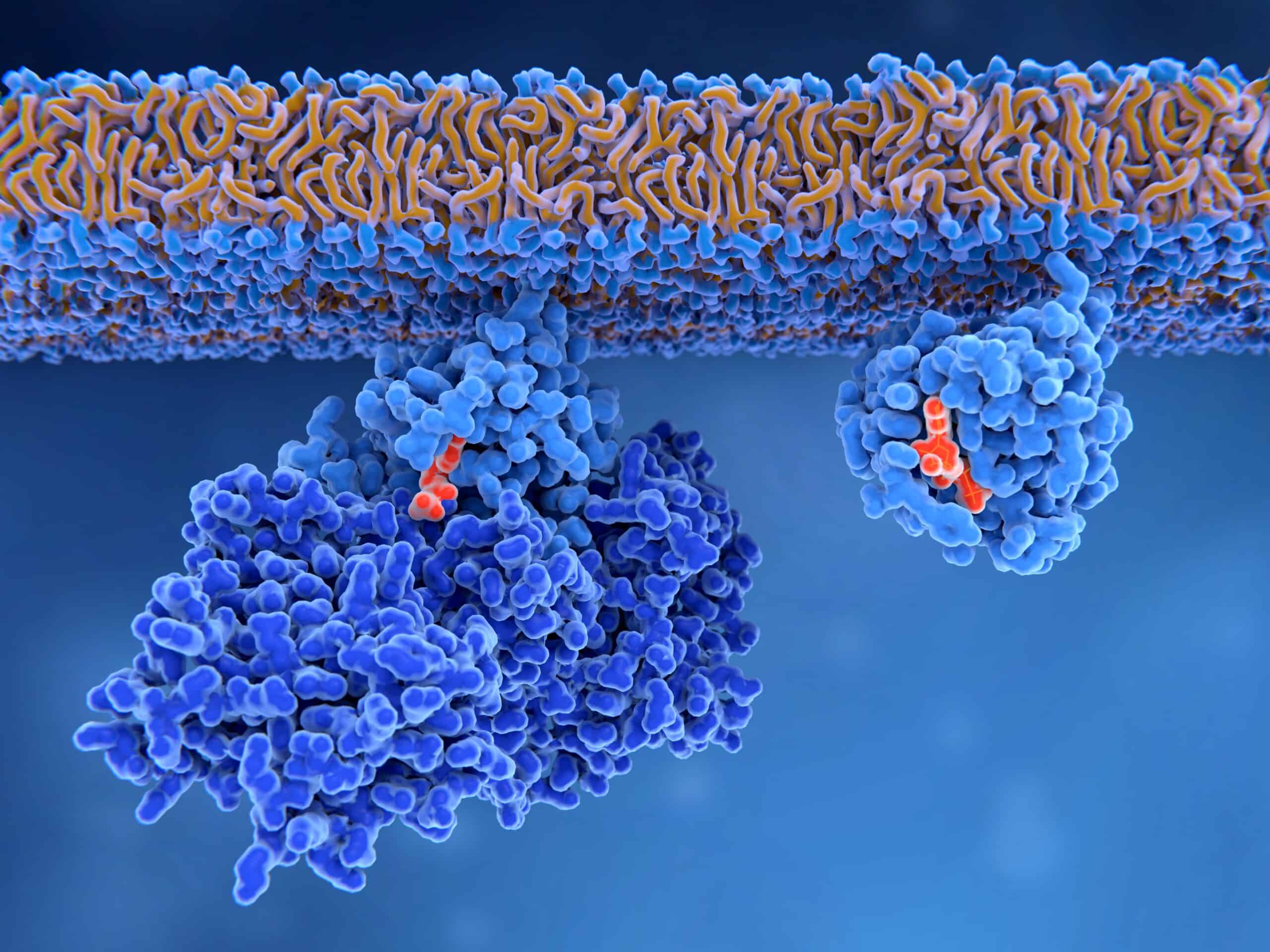Recent advancements have led to the development of new cancer therapies that target mutations in KRAS proteins, which were once considered untreatable. In 2021, the FDA approved the first KRAS-targeted cancer therapy, sotorasib (LumakrasTM). And while researchers in academia and the pharmaceutical industry continue working to develop ways to improve their approach, recent research may be offering the first glimpses of success that it may indeed be possible to drug the “undruggable” KRAS.
KRAS Proteins: The “Undruggable” Protein
KRAS proteins belong to the RAS family of proteins, which are involved in signaling cascades that regulate cell growth, differentiation, and death, and are among the most powerful drivers of cancer. Mutations in the genes encoded in RAS proteins are common in many of the most aggressive cancers, including non-small cell lung cancer (NSCLC), colorectal cancer (CRC), and pancreatic cancer. Approximately 25 percent of all lung tumors and 90 percent of pancreatic tumors have RAS mutations.
Significantly, because of their structure, mutations in the genes encoded KRAS proteins have historically been considered undruggable. KRAS proteins, specifically, help to facilitate not only tumor survival and proliferation but also their ability to evade treatment. And until recently, decades of research had yet to yield a drug that was effectively able to curb KRAS protein activity. The protein was considered impossible to target with treatment.
Challenges of Targeting KRAS Mutations
KRAS functions as a molecular switch that turns on cell growth signals. When KRAS is mutated, it is stuck in the “on” position, which results in unchecked cell growth and tumor formation. Indeed, KRAS proteins are mutated in nearly one quarter of all tumors, and often among tumors that are the most aggressive and deadly.
New Treatments to Target KRAS Proteins
In 2021, the FDA approved the first-ever KRAS-targeted therapy — sotorasib (Lumakras), which is currently approved to treat patients with non-small cell lung cancer (NSCLC) who have the KRAS G12C mutation. Sotorasib is a small molecule drug that works by inhibiting KRAS G12C, one of the most common KRAS mutations found in human cancers, and preventing KRAS from signaling cell growth.
Drug Limitations
While the approval of this drug was a landmark breakthrough, it does have a number of significant limitations. Sotorasib only targets one specific KRAS protein mutation, the G12C mutation. And while the G12C mutation is the most common KRAS mutation in lung tumors, it is not the most common KRAS mutation overall. The majority of cancers with KRAS mutations occur at G12D, meaning that the majority of cancer patients with a KRAS mutation still do not have a treatment option.
Another limitation is in the drug’s transient effectiveness. Research so far has shown that of those with G12C lung cancer treated with sotorasib, only about 28 percent of patients responded. In those with G12C colorectal cancer, the number was even lower: less than 10 percent. And even among those patients who did respond to treatment, the effect was not long-lasting; most patients who responded in clinical trials saw tumor growth slow for only about six months before relapsing.
Still, despite these transient effects, the research remains promising. The 28-percent response rate is nearly twice the response rate of standard chemotherapy. And the initial success in proving that the G12C mutation could be targeted has reinvigorated research into treatments targeting other KRAS protein mutations.
“The KRAS G12C story has told us that you can probably drug other undruggables if you have a phenomenal chemist,” says Patricia LoRusso, an oncologist at Yale School of Medicine. “However, it’s not good enough to just drug it – you have to take it one step beyond.”
Currently, there are dozens of KRAS protein-inhibiting drug trials registered at clinicaltrials.gov. While the majority of these are focused on the G12C mutation, some are looking at the G12D mutation.
QPS is a GLP- and GCP-compliant contract research organization (CRO) delivering the highest grade of discovery, preclinical and clinical drug research development services. Since 1995, it has grown from a tiny bioanalysis shop to a full-service CRO with 1,100+ employees in the U.S., Europe and Asia. Today, QPS offers expanded pharmaceutical contract R&D services with special expertise in neuropharmacology, DMPK, toxicology, bioanalysis, translational medicine and clinical development. An award-winning leader focused on bioanalytics and clinical trials, QPS is known for proven quality standards, technical expertise, a flexible approach to research, client satisfaction and turnkey laboratories and facilities. Through continual enhancements in capacities and resources, QPS stands tall in its commitment to delivering superior quality, skilled performance and trusted service to its valued customers. For more information, visit www.qps.com or email info@qps.com.





